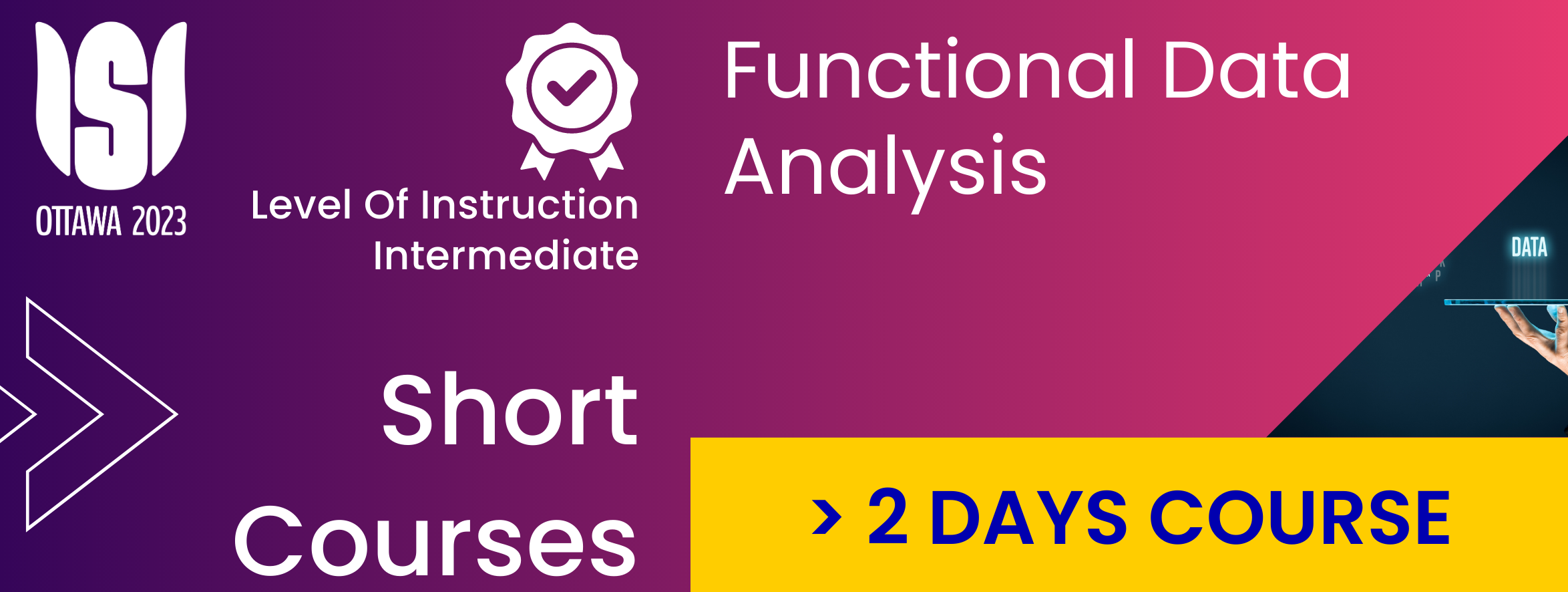Functional data analysis using R for environmental applications
Instructors: Amira Elayouty, Ruth O'Donnell
July 14, 2023 - July 15, 2023
This conference is currently not open for registrations or submissions.
About the Short Course: 2 Days Course
With the tremendous advances in sensor and monitoring device technology, the availability of environmental data is increasing in both quality and quantity at an unprecedented rate. Much of the data recorded over time nowadays are obtained at arbitrarily high temporal resolution. It is natural to think of the time series generated by such dense sampling schemes as observations of a continuous function collected at a finite series of time points. Subsequently, these continuous functions can be estimated and the resulting functions, or curves, become the individual unit of interest in functional data analysis.
Functional data analysis (FDA), which can be defined as the statistical analysis of a sample of such curves, has become of increasing relevance and its techniques have evolved rapidly in recent years reaching a remarkable methodological maturity and proving to be appropriate tools for the analysis of high-resolution data. Most standard statistical methods have been extended to functional data including linear models, time series, spatial statistics, principal component analysis, clustering, etc. This course offers an introduction to functional data and its basic and extended tools of analysis and focuses on their applications to real environmental data problems using R libraries that are oriented to this type of data.
In-Person Event. Location Of Short Courses: University of Ottawa
Who is this course for?
Learning Outcomes
By the end of this course, learners will be able to:
- Identify scenarios where data can be considered as smooth functions
- Implement nonparametric smoothing to represent data as functions when data are inherently high dimensional.
- Construct visualization and data exploration strategies in the functional setting.
- Apply suitable functional data analysis methods Inc. functional principal component analysis, functional clustering and functional linear models to provide solutions to practical environmental data problems.
- Use R to implement FDA techniques and analyze environmental data in the form of functions or curves.
Course Materials
Slides + R tutorials + Environmental data and case studies for demonstration and hands on experience.
Course Content:
- Introduction to Functional Data Analysis
- Discrete Data to Functional Data
- Exploratory analysis and visualization tools of functional data
- Functional principal components analysis
- Functional clustering
- Functional linear models
- Advanced functional data analysis techniques for environmental data applications.
Preparatory Material
Reading the following paper (pages 89-96) is recommended.
Eilers, P. and Marks, B. (1996). Flexible Smoothing with B-splines and Penalties, Statistical Science, 11 (2), 89-121.
The paper is not strictly related to FDA but may help learners to get basic knowledge on smoothing using B-splines which is a building block of functional data analysis.
Delivery Structure
Instructor-led training with hands-on experience to real life applications using R/R-studio, where learners are allowed to ask questions and receive instant responses.
- Instructors demonstrate basic concepts and methodologies with the aid of environmental applications using prepared slides and notes.
- Learners follow well prepared and documented R-tutorials to analyze a variety of environmental data problems using FDA techniques in R/R-studio.
- Instructors discuss with learners the different pieces of analysis resulting from applying an FDA technique to some real-world data sets.
Knowledge Assumed
Knowledge about some multivariate statistics (principal component analysis), smoothing techniques and regression methods is preferred, but not strictly required. Familiarity of R programming is required.
About the instructor: Amira Elayouty
Amira Elayouty is an Assistant Professor at the Department of Statistics, Faculty of Economics and Political Science, Cairo University, Egypt. She has been awarded her Ph.D. degree in Statistics in 2017 from the School of Mathematics and Statistics, University of Glasgow, United Kingdom; and currently is an Honorary Professorial Research Fellow within the same school. Her research interests include spatio-temporal models, generalized additive non-parametric regression models and functional data analysis with a particular focus on high frequency and big environmental and socio-economic data and statistics. She is interested in developing and using such advanced statistical methods to allow for a better understanding of the rapid environmental and socioeconomic changes and their impacts on the places, species, and society and to improve the risk and uncertainty assessment of these changes. Her most recent teaching experience is in the development and delivery of undergraduate and postgraduate levels courses in statistical modelling, functional data analysis and statistical inference. Elayouty joined the International Environmetrics Society (TIES) in 2011 has recently been elected as a Global representative for the society for the period 2021-2025.
Affiliations: Amira Elayouty - Department of Statistics, Faculty of Economics and Political Science, Cairo University, Egypt.
About the instructor: Ruth O'Donnell
Ruth O'Donnell is a lecturer in the Statistics and Data Analytics group within the School of Mathematics and Statistics at the University of Glasgow with 10 years post-doctoral experience. Her research interests lie in developing functional data analysis and non-arametric modelling approaches for applications centered on environmental data. Ruth was research associate on the NERC funded Glob lakes consortium project developing novel approaches for the identification of temporal coherence in lakes using earth observation data and has been involved in a number of projects on maximizing the impact of routine environmental monitoring data. Her most recent teaching experience is in the development and delivery of Honours and Masters levels courses in R programming and flexible regression. Ruth is a
member of the International Environmetrics Society.
Affiliations: School of Mathematics and Statistics, University of Glasgow, United Kingdom.
This conference is currently not open for registrations or submissions.
